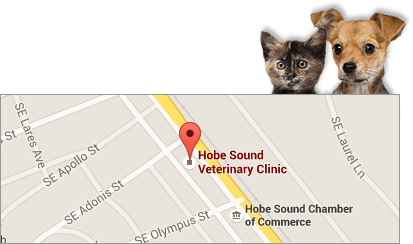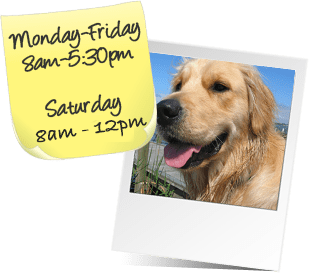The holiday season is a wonderful time filled with joy and cheer, but it’s important to remember that it can present some potential dangers for our beloved pets. While we decorate our homes and savor seasonal goodies, it’s crucial to remain vigilant about common holiday hazards that could harm our furry friends.
Read on as a local vet offers up some tips on how to keep your pets safe during the holiday season.
Toxic Holiday Plants
Many of us adorn our homes with festive plants during the holidays, but some of these can be harmful to pets. Mistletoe, holly, and poinsettias are examples of plants that can cause tummy troubles or more serious reactions if our pets decide to munch on them.
Electrical Cords
The twinkling lights and beautiful ornaments that deck our halls can make our homes look enchanting, but electrical cords can pose a real danger to pets who like to nibble on things. Chewing on cords can lead to electric shocks or burns, which makes them a big risk during this jolly season.
Holiday Treats
Partaking in yummy seasonal treats is a holiday tradition, but many of these foods can be harmful to our furry companions. Chocolate, often found in holiday desserts, is a clear example, as it contains substances that are toxic to pets.
Alcohol and Holiday Foods
As we celebrate with our loved ones, it’s crucial to keep an eye on our pets to ensure they don’t sneak any alcohol or gobble up foods that can be harmful to them. Alcohol can cause serious health issues for pets, and certain foods, like bones and fat trimmings, can lead to tummy troubles.
Open Flames and Candles
Candles add a cozy touch to holiday celebrations, but they also present a fire hazard for pets. Inquisitive animals could accidentally knock over candles, leading to burns or even a house fire. Making sure pets are supervised around open flames is really important for their safety during the festive season.
Things to Keep in Mind
While we’re immersed in the holiday festivities, it’s crucial to keep our furry pals safe. By being aware of common holiday hazards for pets, we can take steps to prevent accidents and create a happy and secure environment for both humans and animals. If you’re planning to host gatherings during the holiday season, you might find our article on Entertaining Guests When You Own a Pet helpful for additional tips on keeping your pets comfortable and safe during social events.
Our Advice on Common Holiday Hazards for Pets in 2024
What specific symptoms should pet owners look out for if their pet has ingested a toxic holiday plant?
Pet owners should watch for symptoms such as vomiting, diarrhea, excessive drooling, or a sudden decrease in appetite if their pet has ingested a toxic holiday plant. More severe reactions might include difficulty breathing, lethargy, or changes in urination. These symptoms can manifest quickly and require prompt veterinary attention to prevent more serious health consequences. Immediate action is crucial, especially during the holidays when typical vet hours may vary. If any of these signs are observed, contacting a veterinarian immediately is essential for the safety of the pet.
What are some common holiday foods, aside from chocolate, that are toxic to pets?
Several common holiday foods aside from chocolate are toxic to pets. These include onions, garlic, and chives, which can cause gastrointestinal irritation and red blood cell damage in animals. Grapes and raisins are highly toxic and can lead to kidney failure. Xylitol, a sweetener found in many baked goods and candies, can cause a rapid and dangerous drop in a pet’s blood sugar. Additionally, fatty foods like gravy or turkey skin can lead to pancreatitis, a severe inflammatory condition of the pancreas.
What are some safe and appropriate holiday treats that pet owners can offer their pets as an alternative to toxic human foods?
Safe holiday treats for pets include small portions of plain, cooked turkey without the skin or bones, which can be a healthy source of protein. Carrots and apples served in moderation and without seeds or cores, offer a crunchy, low-calorie snack. Plain, cooked pumpkin or sweet potatoes are also excellent choices, providing dietary fiber and nutrients without the added spices and sugars of traditional holiday dishes. Additionally, commercially available pet treats formulated specifically for dogs or cats can be a convenient and safe way to include pets in holiday feasting.
How can pet owners manage their pet’s stress levels during the holiday season, particularly when there are many visitors?
To manage pet stress during the holiday season, particularly with increased visitors, pet owners can create a quiet, comfortable space away from the noise where their pet can retreat. Maintaining a consistent routine, including feeding times and exercise, helps provide a sense of normalcy. Introduce pets gradually to visitors and monitor interactions to ensure comfort. Using calming products like pheromone diffusers or calming chews can also be beneficial. It’s essential to observe pets for signs of stress and adjust the environment accordingly to keep them calm and secure.
Are there any specific precautions that pet owners should take with regard to holiday hazards if they have a senior pet?
For senior pets, extra precautions during the holiday season are vital. Older pets may have decreased mobility, so ensuring decorations and hazards like electrical cords are out of reach is crucial. Senior pets might also have diminished senses and cognitive function, making them more prone to accidents. It’s advisable to keep a more predictable environment free from excessive noise and disruption to help reduce stress. Additionally, be vigilant about accessible food and ensure any medications for chronic conditions are not disrupted by the holiday chaos.
And if you have more questions or wish to schedule your furry pal for a wellness checkup, please feel free to call us, your local vet clinic in Jupiter Island, FL, anytime! We offer a range of services to keep your pet healthy and safe, including veterinary surgery should any emergency arise during the holiday season. Our team is committed to providing the best care for your pet, ensuring they stay happy and healthy throughout the year.




